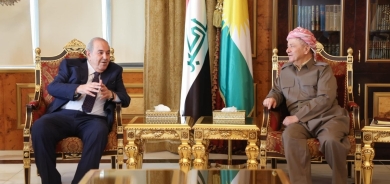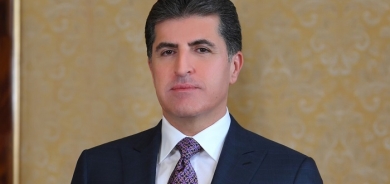Phillips: Kurdistan has the opportunity to gain independence and to be recognized as a sovereign state by the international community
December 22, 2014
Exclusive Interviews

Phillips: This is moment of both Crisis and Opportunity. The Islamic State (IS) represents a challenge to the western values. Kurds share western values with the United States and European countries, and have demonstrated that Iraqi Kurdistan is pivotal to the multi-national coalition fighting against the IS.
Gulan: Professor, you mentioned that it is an opportunity and a challenge, what are the opportunities before the Kurds?
Phillips: Kurdistan has the opportunity to gain independence and to be recognized as a sovereign state by the international community. Kurdistan is indispensable to defeating “Dae’sh. It should be rewarded for its sacrifices.
Gulan: But still U.S. is emphasizing on a unified Iraq in its policies?
Phillips: Emphasizing a unified Iraq is a mistaken approach. The U.S. still views Iraq as a coherent country. In fact, Iraq is a failed state. A third of its territory is controlled by a terrorist organization. The government in Baghdad is strongly influenced by Iran. U.S. policy-maker should have a reality-based approach.
Gulan: You have said that U.S. is pursuing a mistaking policy, but why no pressure has been exerted to change this reality, even Turkey is against an independent Kurdistan? What is your perspective in this regard?
Phiilips: Realizing independence is a great challenge because Turkey and Iran both oppose it. Baghdad and Erbil should come to a mutual agreement. As follow up to the recent Baghdad accord, and as a step towards independence, Iraqi Kurdistan and the Kirkuk Governorate should be recognized as sovereigns. As a sovereign, Kirkuk can associate with Kurdistan. An incremental process is needed establishing roles and responsibilities of Kurdistan and Iraq so that independence is achieved through negotiations and without violence.
Gulan: The Kurds are engaged in fighting Dae’sh, they are in the front lines of combating Dae’sh, but the U.S. is still considering the PYD and PKK, as terrorist organization. Why the U.S. is still insisting on keeping these parties in the list of terrorist organizations?
Phillips: Recently there was an important meeting in Paris between Salih Muslim and the U.S. Special Envoy for Syria. Going forward, the U.S. should closely coordinate its actions with PYD. The heroic defense of Kobani is a game-changer. The PKK, which joined the battle, should be delisted as a foreign terrorist organization by the United States. The government of Turkey is negotiating with PKK and there has been a ceasefire and withdrawal of forces. Ankara is in negotiations with PKK. Delisting the organization can have a positive effect on the political dialogue and move the process forward, resulting in an agreement before Turkey’s national elections in June.
Gulan: Actually we’re aware that U.S. Special Envoy met Salih Muslim in Geneva, but the Kurds are the people who are seriously struggling against Dae’sh in the front lines, the remarkable defense of the Kurds represented a turning point in the war against Dae’sh, they are holding back Dae’sh fighters, and had the Kurds not fought so fiercely, parts of Turkey would have been occupied by Dae’sh, based on these facts, why is the U.S. still hesitant in supporting the Kurds?
Phillips: IS succeeded in bringing together the PYD, the PKK and the Peshmerga. When at-risk, Kurds set aside differences in common purpose. Turkey is at a critical juncture with the so-called peace process. It needs to provide greater political and cultural rights to the Kurds in Turkey, otherwise they will become radicalized. Mr. Erdogan talks about peace, but ultimately he will be judged by his actions not by his words. Voters will judge the AKP when national elections are held in June.
Gulan: Apparently Mr. Erdogan has sympathy to the IS and he is not fighting or taking position against Dae’sh?
Phillips: Mr. Demirel, former president of Turkey, said that most countries have one state, but in Turkey we have two states. Under the AKP, there are still two states. Now the second state is an Islamist State. The AKP’s worldview and the IS ideology are similar, though their tactics are different. Turkey needs to make a decision. Does its future lie with Europe and the West? Down the other path, Turkey is increasingly Islamized and a proxy for the Muslim Brotherhood. It is America’s hope that Turkey will rejoin the western values of democracy and pluralism, and resist radicalization.
Turkey needs to take clear and concrete steps. It should make Incirlik air force base available for the use of U.S. and coalition war plans. It needs to finalize arrangements for train and equip program assisting moderate Syrian opposition. Turkey needs to participate more fully in the international coalition, in order to restore its good standing. The U.S. and Turkey share a goal which is to get rid of Assad.
Gulan: Many observers believe or think that Erdogan has inclination to represent Islamic Caliphate, and he is against Al-Baghdadi Caliph. How do you read this contradiction in Erdogan’s thinking?
Phillips: Erdogan acts like a sultan and caliph of the Muslims world. Rather than humility, hubris is the defining characteristic of Turkey's foreign policy.
Gulan: President Barzani is acting like a Peshmerge, right now he is in the frontlines. He has managed to turn the tide of the battle; we would like to know the world’s view about the Barzani's leadership in the battle against Dae’sh?
Phillips: President Barzani is on the front line, leading an offensive to open the corridor in Sinjar. The International Community has always turned to the Kurds, asked for their help and sacrifice. If the Peshmerge are going to act as boots on the ground fighting IS, Iraqi Kurdistan should be rewarded with direct security assistance and diplomatic support. Instead of delivering weapons through Baghdad, the U.S. should open a direct delivery channel to the Peshmerga via the airport in Erbil. The U.S. should deliver more heavy weapons that can do greater damage to IS fighters.
Gulan: Iraq has become a playing field for Iran's policy, Iran is manipulating in the area, right now HADI AL AMERI, is mobilizing a population in ANBAR province, how far do you think this endanger the Iraq to go in civil war?
Phillips: Iraq should be governed through rule of law. Popular mobilization to establish militias may have short term benefits for security, but in the long term militias destabilize Iraq and risk creating conflict between sectarian groups. The Islamic State cannot be defeated unless the Sunni tribes are involved. A strategy for fighting the Islamic state must include the Iraqi armed forces, the Peshmerga, and the Sunni tribes. There also needs to be a plan for governing Mosul after it is liberated.
Gulan: KRG has reached an agreement with Baghdad government, what is the importance of this agreement in alleviating the hardship Kurdistan faces?
Phillips: It is a very important agreement. However, it is just a temporary agreement that will be in effect for just a year. The agreement allows financial resources to flow to Kurdistan regional government, easing its cash flow problems. It also establishes benchmark for exporting oil from Kurdistan including Kirkuk. The agreement needs to be formalized as part of the budget bill by the Iraqi parliament. Then Baghdad and Erbil will renegotiate an agreement reflecting current realties. In 2015, Kurdistan will take steps to strengthen its institutions as it moves towards sovereignty and independence.
Gulan: It has been decided to form three battalions for peshmerga, and also a USA air base be established near Erbil, and how far USA will provide heavy weapons to peshmerga? We believe that heavy weapons include all sorts of weapons except nuclear one?
Phillips: The peshmerga need a steady flow of ammunitions, and they need heavy weapons that are capable of countering sophisticated weaponry of the Islamic state. When the Iraqi army fled Mosul, they left weapons for Daish. Islamic State fighters are well-equipped with weapons made in the USA.The peshmerga need to be better equipped. Fortunately Germany has provided MILAN missiles and France has provided 20 millimeter armor piercing munitions. The United States needs to give the peshmerga the tools to be a more effective fighting force. There is no danger that the peshmerga would use those weapons against Baghdad or fight for independence. When there is a move for independence, it will be through negotiation.
Gulan: What the peshmerga forces most need is tank and air force, is there any chance that these weapons be provided to peshmerga?
Phillips: I am not a military man, so I’m not well qualified to respond. I do believe the Kurds need equipment and training. Iraqi Kurdistan’s success is in the interest of America, the world, as well as Kurds.
Gulan: All the discussions are revolving around Mosul, and the governor of Mosul is based in Erbil, and the Shias feel helpless, is there any chance that the Kurds and Sunnis cooperate and liberate Musil?
Phillips: Yes, there is a basis for cooperation. But Mosul is a big city. US air power will not be decisive in this battle. The battle for Mosul will be street to street, engaging ground forces. The peshmerga are capable and committed. The governor of Mosul has proposed arming the police. The police and Sunni tribes will need to be carefully vetted and their commitment proven.
Gulan: Dispatching peshmerga to Kobani was a turning point in this war, and right now peshmerga is still based in Kobani, how far do you think sending peshmerga to Kobani melted down the borders between two parts of Kurdistan and how do you evaluate the situation?
Phillips: The arrival of peshmerga to Kobani has symbolic significance. The defenders of kobani don't need more manpower. They need more weapons. They need artillery and sophisticated weapons to counter Islamic State forces that are attacking the city.
Syria now is a failed state. The grinding civil war will end some day. Syria will look a lot like Bosnia looked at the end of its civil war, with three cantons each controlled and protected by militias and each self-governed. The relations between KRG and PYD have greatly improved. Rojava and Iraqi Kurdistan have shared strategic interests. Ultimately Kurdistan needs access to the sea, which could be along a corridor through Kurdish controlled areas in Syria to Lattakia to Tartus. Kurdish issues need to be addressed regionally not just as an Iraqi issue.
Gulan: One year ago you requested or proposed the PKK be delisted and the Abdulla Ojalan be released but so far Turkey did not do anything like that, don't you think it is time that this step be taken?
Phillips: I proposed improving the conditions of his detention and increasing international access. Delisting the PKK is overdue. The US should take the imitative to delist the PKK, which would have a positive effect on negotiations.
Gulan: In this very moment you are in Kurdistan how do you read the current situation of Kurdistan and how do you see the future of Kurdistan?
Phillips: I was in Mardin on August 9 on my way to Erbil. However, I was unable to come because the air space was closed and all commercial flights were cancelled. There a period of great crisis, but the crisis is now passing. The Kurdistan Regional Government and the peshmarga have shown the capacity to confront Daish. They proved their commitment as an ally of the United States in the war on terror. The United States should recognize Iraq for what it is, not what it hopes Iraq will be. At the end of the day, America's best and only friends in Iraq will be the Kurds.















